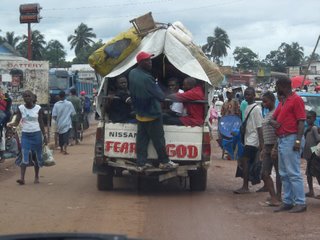 I have been looking forward to Advent for some time. I always loved advent, as a child, because it marked the time of anticipation before Christmas. But I think this year what I've been longing for is the waiting and the hope that advent represents.
I have been looking forward to Advent for some time. I always loved advent, as a child, because it marked the time of anticipation before Christmas. But I think this year what I've been longing for is the waiting and the hope that advent represents. Here in Liberia there is much waiting: waiting for supplies, waiting for long overdue pay checks, waiting for clean wells to be drilled, waiting for the government to be capable, waiting for the peacekeepers to leave, waiting for stability, waiting for an economy, waiting for jobs, waiting for a better life. But at the end of 15 years of unthinkable brutality, atrocities, and horror, I'm not sure how easily hope comes. In the face of all they long for, and all they have survived, the people of Liberia continue to live. They live in the toil of their everyday routines, but also in their laughter, in their singing, in their arguing, in their bright colored cloth, in 9 people stuffed in a taxi, in their extended families, and in their dependence on one another.
The beauty of advent is the presence of hope in God's promise. On Sunday the preacher reminded us that God is, and was, and will be. And in advent it's the "will be" that we celebrate.
What "will be" for Liberia? It's difficult to hope in the face of the unknown, with only "small small" progress being made. What I learned about hope when I was doing relief work after Hurricane Katrina, is that the hope that made a difference to people was the hope brought by each volunteer, and each shipment of food. When they couldn't hope for a better tomorrow, they had hope from support, hope from friendship, hope from a helping hand, hope from love. That is the hope that sustained people.
I hope that by your support and prayers, and my presence here, together we are a "small small" ray of hope in Liberia. From day to day, I don't do anything too spectacular. I grade papers; I scrape together mediocre lectures; I supervise the planting of some corn; I show my students how to give injections to pigs; I walk from farm to class and back again; and I look forward to the weekend as much as the students do. Recently I have felt discouraged with myself because of how truly mediocre my service here seems to be. But with the coming of advent, hope has returned to me as well. Life is perhaps rarely spectacular, even for a missionary in Africa. Each of us, no matter where we live, are called to do our "small small" piece, and together all of our mediocre and feeble efforts, set the great tides of hope and love, which bring light to the darkest places and times in human hearts, and become the human experience of God on earth… something truly spectacular!
Yes, this season we await the promise, we await the kingdom, and we celebrate an experience which is beyond the confines of any religion: the collective power of this human experience of weakness, hope, and love.



